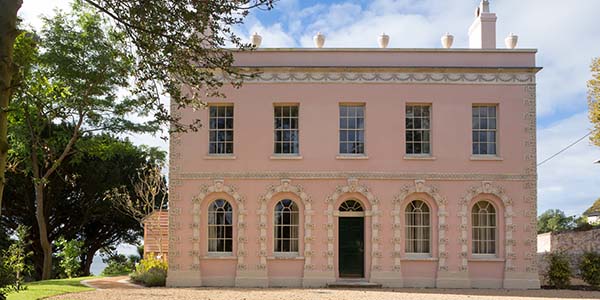
After Mrs Coade Belmont passed through a line of tenants until 1881, when it was bought by Dr Richard Bangay. His was a remarkable life, the illegitimate son of a Norfolk maid, who ran away to Newcastle where he worked in the mines and taught himself to read. Later in life, after training to become a Doctor, he lived at Belmont until 1896.
Most recently, Belmont belonged to John Fowles, one of the most significant authors of the late 20th-century whose works include The Magus and French Lieutenant’s Woman. John Fowles’s wish was that other writers might be as inspired by Belmont as he himself had been, and he came to believe that the Landmark Trust was the only means to achieve this. Today we respect John Fowles’s wishes by offering two weeks a year to creative writing groups, to come and stay in the house where Fowles worked for 40 years. To date, groups from the University of East Anglia and New College, Oxford (Fowles’s own former college) have enjoyed free study breaks at Belmont in pursuit of literature and creative writing. These breaks have in turn acted as a catalyst for trials of another scheme, Landmark Futures, through which we hope to offer other academic institutions the change to nurture those ‘light bulb moments’ in their own field of study in other Landmarks.

‘We are enormously grateful for the opportunity we were afforded at Belmont to work collaboratively on our project, which gave us time and the most beautiful of spaces to think and write separately as well as together. …Appearances, including and especially the ‘mood’ of a room, can alter radically from moment to moment. I thought about this a great deal at Belmont, with its different lights and shadows, its views across the gardens to the sea, and its careful placing of a desk and a chair in the high-ceilinged rooms. An inspiration, indeed. ‘
- Professor Laura Marcus, Goldsmith professor of English Literature, New College Oxford
‘When Dennis thought ‘Writer’s Retreat’, all he could think of was Tolstoy and J.D. Salinger and Flannery O’Connor and Ben Marcus and so on falling back through the trenches in a staggered formation, providing covering fire for one another as they pulled back across the wheat fields, hurrying from Greek column to Greek column. Despite this he went to Lyme Regis on a writer’s retreat with his friends Sally, Georgiana and Bjorn….’
- Belmont Creative Writers’ Logbook entry, James Barnes, UEA
John Fowles’s chief legacy is an intellectual one, and lies in his works and these are fully represented in the extensive collection of books in the library at Belmont. Referring to the catalogue of Fowles’s own many books (his collection was sold by his widow at his death) we have also chosen books representing his own interests and library – French existentialist writers, local and natural history, social history and many others. We have bound a full run of his curator’s annual reports for the Lyme Regis museum, where he was curator from 1978-89 and archivist until 1999. The three volume catalogue of his full collection is also on the shelves. We have also been able to buy back a number of books from Fowles’s own books that, ten years after his death, remained unsold from his collection. We are especially pleased that some of the books on the shelves bear his Reynolds Stone bookplate or his stamp, and some even have his annotations.

Fowles is one of the three former residents focused upon in the permanent exhibition curated by Landmark in the former stables next door to the main house. Anyone is welcome to visit on Friday afternoons between April and October each year. Within there are two information boards and several of his key works, as well as his typewriter. Everyone is welcome to visit on Belmont’s on free public open days.